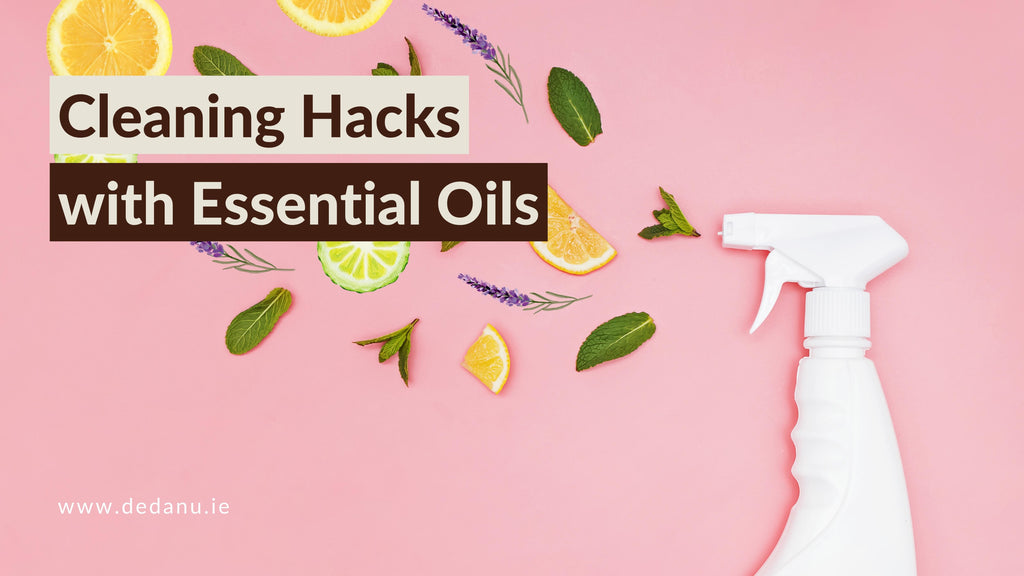Cleaning Hacks with Essential Oils
 Cleaning Hacks with Essential Oils: Creating a Natural, Non-Toxic Home Environment
Cleaning Hacks with Essential Oils: Creating a Natural, Non-Toxic Home Environment
In today's fast-paced world, maintaining a clean and healthy home is more important than ever. However, many popular cleaning products contain harsh chemicals that can be harmful to both our health and the environment. Enter essential oils – nature's answer to a non-toxic, effective, and eco-friendly cleaning solution. In this blog post, we'll explore the benefits of using essential oils in cleaning, the dangers of synthetic cleaning agents, and share some cleaning hacks to help you create a natural, non-toxic home.
Benefits of Essential Oils in Cleaning at Home
Essential oils not only offer a natural and safe alternative to traditional cleaning products, but they also provide a range of benefits:
Powerful Cleaning Properties
Many essential oils, such as tea tree, lemon, and eucalyptus, possess powerful antimicrobial, antifungal, and antiviral properties, making them effective cleaners (Orchard & van Vuuren, 2017)[1].
Pleasant Aroma
Essential oils add a pleasant and refreshing aroma to your home, creating a welcoming and uplifting environment.
Eco-friendly
By using essential oils in your cleaning routine, you reduce the number of synthetic chemicals released into the environment, making them a more sustainable option.
Customisable
You can create personalized cleaning solutions by combining different essential oils to suit your preferences and specific cleaning needs.
Dangers of Popular Synthetic Cleaning Agents
Many conventional cleaning products contain harmful chemicals that can pose risks to our health and the environment:
Health Risks
Exposure to chemicals found in cleaning products, such as ammonia, bleach, and phthalates, can lead to respiratory issues, skin irritation, and hormone disruption (Steinemann, 2016)[2].
Environmental Impact
Synthetic cleaning agents can contaminate water sources, contribute to air pollution, and harm aquatic life (Llompart et al., 2013)[3].
Increased Antibiotic Resistance
Overuse of antibacterial cleaning products can contribute to the development of antibiotic-resistant bacteria, posing a significant threat to public health (Aiello et al., 2005)[4].
Essential Oil Cleaning Hacks for a Natural, Non-Toxic Home
Transform your home into a natural haven by incorporating essential oils into your cleaning routine:
All-Purpose Cleaner
Combine equal parts water and white vinegar in a spray bottle, add 20 drops of lemon essential oil and 10 drops of tea tree oil for a versatile all-purpose cleaner. Use it to clean countertops, glass surfaces, and tiles.
Floor Cleaner
Mix 1 cup of water, 1 cup of white vinegar, and 10 drops each of lavender and eucalyptus essential oils in a bucket. Use this solution to mop your floors, leaving them clean and smelling fresh.
Carpet Freshener
Combine 1 cup of baking soda with 15 drops of your favorite essential oil (e.g., lavender, rosemary, or peppermint). Sprinkle the mixture onto your carpets, let it sit for 10-15 minutes, then vacuum as usual.
Bathroom Cleaner
Create a natural bathroom cleaner by mixing 1 cup of water, ½ cup of baking soda, and 10 drops each of tea tree and eucalyptus essential oils. Apply the mixture to your bathroom surfaces, scrub, and rinse with water.
Laundry Booster
Add 5-10 drops of your preferred essential oil (e.g., lavender, lemon, or cedarwood) to your laundry detergent for a natural scent boost and antimicrobial benefits.
Incorporating essential oils into your cleaning routine is a simple and effective way to create a natural, non-toxic home environment. Not only do essential oils offer powerful cleaning properties, but they also provide a pleasant aroma and are eco-friendly. By replacing synthetic cleaning agents with essential oil-based alternatives, you can protect your family's health, reduce your environmental impact, and create a welcoming, clean, and rejuvenating living space. Embrace the power of nature with essential oils and transform your home into a sanctuary of well-being and sustainability.





Leave a comment